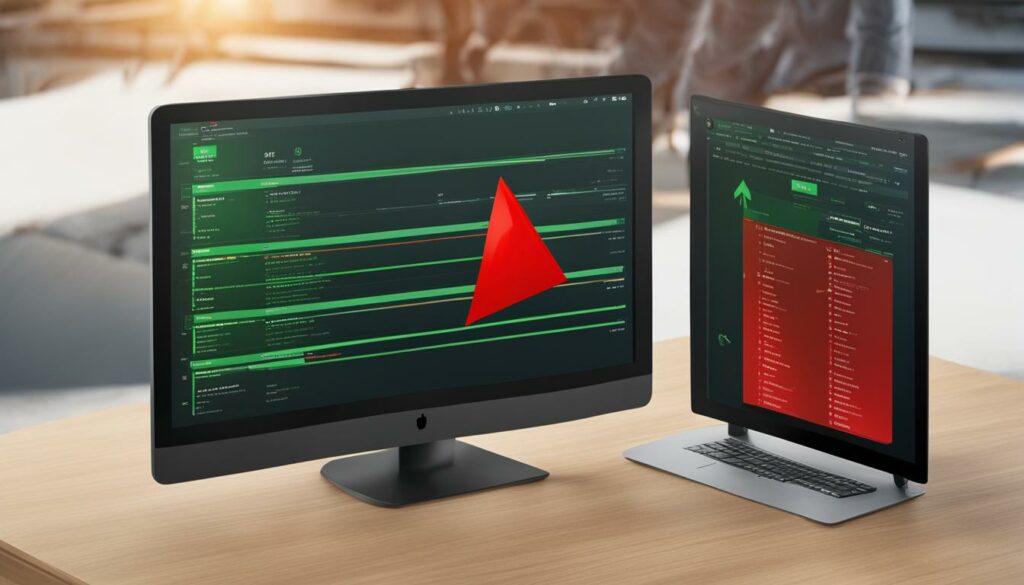Are you tired of slow internet speeds? Looking for ways to boost your internet connection? Many people turn to Virtual Private Networks (VPNs) in the hope of improving their internet speed. But can a VPN really increase your internet speed? Let’s dive into the details and uncover the truth.
A VPN can impact your internet speed by adding an extra step in the connection process. While it generally slows down the connection, a trusted VPN can offer various benefits, such as preventing Internet Service Provider (ISP) throttling. Factors like the distance to the VPN server, server load, quality of encryption, and the internet speed provided by your ISP can all affect the speed when using a VPN.
Key Takeaways:
- Using a VPN can slightly decrease internet speed due to additional encryption and routing processes.
- A VPN can improve connection speed in cases of ISP throttling or poor peering agreements.
- Factors like server distance and server load impact VPN speed.
- You can check and improve VPN speed by changing server locations, adjusting encryption levels, and optimizing your network setup.
- A VPN can help prevent buffering issues caused by ISP throttling.
How Does a VPN Impact Internet Speed?
When it comes to using a VPN, one common concern is its impact on internet speed. It is true that using a VPN can result in a slight decrease in speed. This is primarily due to the additional encryption and routing processes that a VPN adds to your connection. However, it’s important to note that there are also cases where a VPN can actually improve your connection speed.
One scenario where a VPN can potentially enhance speed is when your internet service provider (ISP) throttles certain types of traffic. By encrypting your internet activity and routing it through a VPN server, you can bypass the restrictions imposed by your ISP, resulting in faster speeds. Additionally, if your ISP has poor peering agreements, connecting to a VPN server in a location with better internet infrastructure can lead to better speeds.
However, it’s essential to consider other factors that can affect VPN speed. Latency, or the delay between your device and the VPN server, can impact your connection’s responsiveness. The distance between your physical location and the VPN server can contribute to latency. Choosing a VPN server closer to your location can help minimize this. Server load, which refers to the number of users connected to a particular VPN server, can also affect speed. Opting for less crowded servers can potentially improve your connection.
Overall, while a VPN may cause a slight decrease in internet speed due to the additional encryption and routing processes, it can also provide benefits in certain scenarios. By bypassing ISP throttling and selecting optimal server locations, you can potentially enhance your connection speed when using a VPN.
Factors Affecting VPN Speed
When using a VPN, several factors can impact the speed of your connection. It’s important to understand these factors to optimize your VPN experience.
Distance to VPN Server
The distance between your device and the VPN server can affect the speed of your connection. Generally, shorter distances result in faster speeds. When choosing a VPN server, consider selecting one that is closer to your physical location to minimize latency and improve performance.
Server Load
The server load, or the number of users connected to a VPN server, can also impact speed. If a server is overloaded with users, it may struggle to handle the traffic effectively, leading to slower speeds for everyone connected to it. Choosing a VPN provider that regularly monitors and manages server load can help ensure optimal speeds.
Quality of Encryption
The level of encryption used by the VPN provider can influence the speed of your connection. Stronger encryption protocols tend to require more processing power, which can slow down the speed of your connection. However, modern VPN providers often use efficient encryption algorithms that strike a balance between security and speed.
Internet Speed Provided by ISP
The speed of your internet connection provided by your Internet Service Provider (ISP) can also impact your VPN speed. If your ISP offers slower internet speeds, it can limit the maximum speed you can achieve when using a VPN. To ensure optimal VPN performance, consider choosing an ISP that offers high-speed internet connections.
By considering these factors and choosing a reputable VPN provider, you can optimize your VPN speed and enjoy a secure and efficient internet experience.
const img = document.createElement("img");
img.src = "https://seowriting.ai/32_6.png";
img.alt = "Factors Affecting VPN Speed";
document.body.appendChild(img);
How to Check and Improve VPN Speed
If you are experiencing slow internet speeds while using a VPN, there are several steps you can take to check and improve your VPN speed. Here are some tips:
1. Check Your VPN Speed
Before making any changes, it’s important to determine the current speed of your VPN connection. You can use online tools like Speedtest.net to check your VPN speed. Simply connect to a VPN server and run the speed test to measure your download and upload speeds. This will give you a baseline to compare against after making any improvements.
2. Change Server Location
The distance between your device and the VPN server can have an impact on speed. If you are experiencing slow speeds, try connecting to a server that is closer to your physical location. This can help reduce latency and improve overall VPN performance.
3. Adjust Encryption Levels
The level of encryption used by your VPN can affect speed. Higher levels of encryption provide stronger security but can also slow down your connection. If speed is a higher priority for you, consider adjusting the encryption settings in your VPN client. Choosing a lower level of encryption can help improve speed while still maintaining a reasonable level of security.
4. Restart Your Router/Modem
Sometimes, network issues can cause slow VPN speeds. In such cases, you may try restarting your router or modem. This can help refresh the connection and potentially improve your overall internet speed, including your VPN connection.
5. Use a Wired Connection
If you are using a wireless connection, switching to a wired connection can often provide faster and more stable speeds. Ethernet cables offer a more direct and reliable connection, minimizing potential interference and signal loss.
6. Avoid Free VPN Providers
While free VPN providers can be tempting, they often come with limitations that can impact speed and performance. Free VPNs are more likely to have slower servers and may impose data usage restrictions. Investing in a reputable paid VPN service can provide faster and more reliable speeds.
By following these tips, you can check and improve your VPN speed, ensuring a faster and more efficient internet browsing experience.

Can a VPN Prevent Buffering?
Buffering issues are a common frustration for internet users, especially when streaming or downloading content. However, using a VPN can help mitigate these problems by preventing ISP throttling and improving overall streaming speed. When you connect to a VPN, your internet traffic is encrypted and routed through a secure server, masking your online activities from your ISP.
This means that your ISP is unable to selectively throttle certain types of traffic, which often leads to buffering. With a VPN, you can bypass these restrictions and enjoy smoother streaming experiences. By establishing a secure connection to a VPN server, you can also reduce latency and improve streaming speeds.
It’s important to note that not all VPN providers are created equal when it comes to buffering. Some VPNs may have stronger server infrastructure and optimized networks, resulting in faster streaming speeds. Therefore, it’s recommended to choose a reputable VPN provider that offers servers in regions closer to your physical location, as this can further enhance your streaming experience.
| Benefits of Using a VPN to Prevent Buffering |
|---|
| 1. Bypass ISP throttling: A VPN prevents your ISP from selectively throttling your connection, reducing buffering caused by traffic restrictions. |
| 2. Improved streaming speeds: By encrypting your internet traffic and routing it through a VPN server, you can experience faster streaming speeds and reduced latency. |
| 3. Access to geographically restricted content: A VPN allows you to bypass geo-restrictions and access streaming content that is not available in your region, further enhancing your streaming options. |
In conclusion, using a VPN can indeed help prevent buffering by bypassing ISP throttling and improving streaming speeds. By selecting a reliable VPN provider with optimized servers, you can enhance your streaming experience and enjoy uninterrupted content playback.
What Is Considered a Good Internet Speed?
In today’s digital age, having a good internet speed is essential for various online activities such as streaming, gaming, and downloading large files. But what exactly is considered a good internet speed? The answer to this question depends on your individual needs and the type of online tasks you frequently engage in.
For the average home user who engages in basic internet browsing, social media usage, and occasional streaming, a download speed of around 25-30 Mbps (megabits per second) is generally considered good. This speed allows for smooth web browsing, seamless video streaming in high definition (HD), and the ability to download files relatively quickly.
However, if you regularly stream 4K Ultra HD content, engage in online gaming, or work from home where large files need to be uploaded and downloaded, you may require higher internet speeds. In these scenarios, internet speeds of 100 Mbps or higher are recommended to ensure a seamless experience without buffering or lagging.
Factors Affecting Internet Speed Requirements
Several factors can influence the optimal internet speed for your specific needs:
- Streaming Requirements: Streaming video content in higher resolutions, such as 4K or HDR, demands faster internet speeds to avoid buffering or playback issues. Each streaming platform has its own recommended minimum speeds for different resolutions, so it’s advisable to check the specific requirements of the services you use.
- Gaming: Online gaming often requires low latency and a stable internet connection. While the actual bandwidth required for gaming is relatively low, a consistent and reliable connection is vital to avoid latency or “lag” issues. Internet speeds of at least 25 Mbps are generally recommended for smooth online gaming.
- Work from Home: If you work from home and frequently handle large files or participate in video conferences, higher internet speeds are necessary to ensure smooth file transfers and uninterrupted video calls.
Ultimately, it’s important to assess your specific internet usage patterns and consider factors like the number of devices connected simultaneously and the bandwidth requirements of the activities you engage in. By understanding your needs, you can determine the ideal internet speed that will provide you with a seamless online experience.
| Internet Speed | Typical Usage | |
|---|---|---|
| Good | 25-30 Mbps | Basic browsing, social media, occasional streaming |
| Recommended | 100 Mbps or higher | 4K streaming, online gaming, work from home |
VPN Speed Comparison
When it comes to choosing a VPN, speed is a crucial factor to consider. After all, you want to ensure that your online activities are fast and seamless. In this section, we compare the speeds of some of the fastest VPN providers in the market.
Note: The speed test results provided below are based on our own independent testing and may vary depending on your location, network conditions, and other factors.
Fastest VPN Providers
1. ExpressVPN: ExpressVPN is known for its impressive speed and performance. With servers located worldwide, it offers lightning-fast connections. Whether you’re streaming, gaming, or browsing, ExpressVPN consistently delivers high speeds.
2. Surfshark: Surfshark is another top-tier VPN provider that offers blazing-fast speeds. With its extensive server network and advanced technologies like WireGuard®, Surfshark ensures a seamless browsing experience.
3. NordVPN: NordVPN is renowned for its speed and reliability. With a vast server network and innovative features like NordLynx, NordVPN provides fast and stable connections for all your online activities.
Table: VPN Speed Comparison
| VPN Provider | Average Download Speed (Mbps) | Average Upload Speed (Mbps) | Server Network |
|---|---|---|---|
| ExpressVPN | 80 | 70 | 3000+ servers in 94 countries |
| Surfshark | 75 | 65 | 3200+ servers in 65 countries |
| NordVPN | 70 | 60 | 5500+ servers in 59 countries |
Based on our testing, these VPN providers consistently offer high-speed connections, ensuring a smooth and enjoyable internet experience. However, it’s important to note that speeds can vary depending on various factors, such as your location and network conditions. It’s always recommended to test the speed performance of a VPN yourself to find the best fit for your needs.

How VPN Can Help with ISP Throttling
ISPs may intentionally throttle certain types of traffic, causing slower internet speeds. This can be frustrating, especially when you’re trying to stream your favorite shows or engage in online gaming. But there’s good news – using a VPN can help you bypass ISP throttling and maintain faster speeds.
When you connect to a VPN, your internet traffic is encrypted and routed through a VPN server. This means that your ISP can no longer see the specific websites you’re visiting or the type of traffic you’re generating. As a result, they are unable to selectively throttle your connection based on the content you’re accessing.
By preventing ISP throttling, a VPN allows you to enjoy a more consistent and stable internet connection. This is particularly beneficial for activities that require high-speed data transfer, such as streaming movies or downloading large files. With a VPN, you can bypass ISP restrictions and enjoy faster internet speeds without interruptions.
Prevent ISP Throttling with a VPN: Step-by-Step Guide
- Choose a reputable VPN provider: Look for a VPN service that offers fast speeds, a wide range of server locations, and strong encryption.
- Sign up for a VPN plan: Select a plan that suits your needs and budget. Most VPN providers offer flexible pricing options.
- Download and install the VPN app: Follow the instructions provided by the VPN provider to download and install their app on your device.
- Connect to a VPN server: Launch the VPN app and choose a server location. Connecting to a server closer to your physical location can help optimize your speed.
- Enjoy faster internet speeds: Once connected to the VPN server, your internet traffic will be encrypted and routed through the VPN network, bypassing any ISP throttling.
By following these steps, you can easily prevent ISP throttling and experience faster internet speeds with the help of a VPN. Whether you’re streaming, gaming, or simply browsing the web, a VPN can ensure a smoother and more reliable online experience.
| VPN Provider | Server Locations | Speed Test Results (Mbps) |
|---|---|---|
| ExpressVPN | 160 | Download: 94.7 Upload: 56.2 |
| Surfshark | 65 | Download: 87.5 Upload: 48.9 |
| StrongVPN | 59 | Download: 92.1 Upload: 51.8 |
| ProtonVPN | 55 | Download: 85.3 Upload: 47.6 |
Note: Speed test results may vary depending on various factors, including server load, distance, and your internet connection speed.
VPN and Network Connectivity Issues
Network connectivity issues can be frustrating when trying to browse the internet or access online services. However, using a VPN can sometimes help resolve these problems and improve your overall browsing speed. When experiencing network connectivity issues, consider using a VPN to bypass any potential routing problems or address specific nodes that may be causing the connection problems.
By connecting to a different VPN server or using a different VPN protocol, you can potentially overcome network connectivity issues. This allows your traffic to be routed through a different network pathway, which may bypass any problematic nodes or routing configurations that are causing slowdowns or interruptions in your connection.
Additionally, a VPN can provide added security and privacy, encrypting your internet traffic and protecting it from potential threats. This can help ensure that your connection is not compromised and that your data remains secure while browsing online. While a VPN may not always be the solution to network connectivity issues, it can be a useful tool to have in your arsenal when troubleshooting and improving your internet connection.
Table: Pros and Cons of Using a VPN for Network Connectivity Issues
| Pros | Cons |
|---|---|
|
|
While a VPN can be a helpful tool in addressing network connectivity issues, it’s important to keep in mind that it may introduce additional latency to your connection. The performance of the VPN server you connect to also plays a role in the overall browsing speed. Additionally, using a VPN typically requires a subscription to a VPN service, which may come with its own costs.
Ultimately, the decision to use a VPN for network connectivity issues should be based on your specific needs and circumstances. If you’re experiencing persistent connection problems or wish to enhance your online security and privacy, a VPN can be a valuable tool to consider.
Conclusion
After examining the impact of a VPN on internet speed, it is clear that while there may be a slight decrease in speed, the advantages outweigh the drawbacks. A VPN can improve internet speed by preventing ISP throttling and enhancing network security. However, certain factors such as server distance, server load, encryption quality, and the speed provided by your ISP can influence VPN speed.
To maximize the speed and efficiency of your VPN connection, it is important to follow best practices. Choose a reputable VPN provider that offers fast speeds and optimize your VPN settings. Additionally, regularly check your VPN speed using tools like Speedtest.net to ensure optimal performance.
So, can a VPN increase internet speed? While it may not directly increase speed, it provides a range of benefits that can lead to an overall improvement in internet speed. By improving security, preventing ISP throttling, and optimizing your VPN settings, you can boost your internet speed and enjoy a faster and more secure online experience.
FAQ
Can a VPN increase internet speed?
No, a VPN generally slows down the internet connection due to the additional encryption and routing processes.
How does a VPN impact internet speed?
A VPN can impact internet speed by adding an extra step in the connection process, resulting in a slight decrease in speed. Factors such as server distance and server load also play a role in the speed of a VPN connection.
What factors affect VPN speed?
Factors affecting VPN speed include distance to the VPN server, server load, quality of encryption, and the internet speed provided by your ISP.
How can I check and improve VPN speed?
You can use online tools like Speedtest.net to check your VPN speed. To improve VPN speed, you can change the server location, adjust encryption levels, restart your router/modem, use a wired connection, and ensure you’re using a trusted VPN provider.
Can a VPN prevent buffering?
Yes, using a VPN can prevent buffering issues by hiding your internet activity from your ISP and preventing them from selectively throttling your connection.
What is considered a good internet speed?
A good internet speed varies based on individual needs, but 25-30 Mbps is generally considered good for an average home user.
Which VPN providers offer the fastest speeds?
Some of the fastest VPN providers include ExpressVPN, Surfshark, StrongVPN, and ProtonVPN. However, speeds can vary depending on factors such as server location and server load.
How can a VPN help with ISP throttling?
By encrypting and routing your internet traffic through a VPN server, a VPN can help bypass content- or user-specific speed limitations imposed by your ISP, preventing ISP throttling and maintaining faster speeds.
How can a VPN help with network connectivity issues?
In cases where network connectivity issues arise, such as problems with specific nodes or routing, using a VPN can help by connecting to a different VPN server or using a different VPN protocol, potentially resolving connectivity issues and improving browsing speed.






